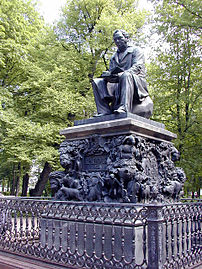| This article needs additional citations for verification. Please help improve this article by adding citations to reliable sources. Unsourced material may be challenged and removed. Find sources: "Peter Clodt von Jürgensburg" – news · newspapers · books · scholar · JSTOR (January 2021) (Learn how and when to remove this message) |
You can help expand this article with text translated from the corresponding article in Russian. (September 2014) Click for important translation instructions.
|


Peter Jakob Freiherr Clodt von Jürgensburg, known in Russian as Pyotr Karlovich Klodt (Russian: Пётр Карлович Клодт; 5 June 1805, Saint Petersburg – 25 November 1867, Klevenoye, Vyborg Governorate), was a favourite sculptor of Nicholas I of Russia.
Biography
Klodt belonged to a distinguished family of Baltic Germans, the Clodt von Jürgensburgs. The family's origin remains unknown, but many speculate that it originated in Westphalia. Klodt started his career as a professional artillery officer and amateur sculptor. He attended classes at the Imperial Academy of Arts in Saint Petersburg, where his mastery in depicting horses eventually won him the rank of academician and the praise of the Emperor. As legend has it, Nicholas I remarked of Klodt that he "creates horses finer than any prize stallion does".
Klodt's most famous group of equestrian statues, the Horse Tamers, was installed at the Anichkov Bridge in 1851. He also produced the bronze statue of Ivan Krylov in the Summer Garden (1848–55). It was the first monument to a poet erected in the Russian Empire.
Klodt collaborated with Vasily Demut-Malinovsky on the statue of Saint Vladimir in Kiev (installed in 1853) and the statuary for the Narva Triumphal Gate. He also sculpted a quadriga above the portico of the Bolshoi Theatre in Moscow.
Klodt's last significant work was a posthumous tribute to his patron, a horse statue for the equestrian Monument to Nicholas I on Saint Isaac's Square. Installed in 1856–1859, it was the first equestrian statue in the world with only two support-points (the rear feet of the horse). Even the Bolsheviks, who destroyed the memorials to Nicholas I across Russia, did not dare to demolish this unique statue.
Klodt died in his estate in the Grand Duchy of Finland (autonomous state of the Russian Empire) on 20 November 1867. His son and nephew Mikhail continued the artistic traditions of the family and became notable painters of the Peredvizhniki school.
-
 The monument to Nicholas I of Russia in St. Petersburg, late 19th century photochrome print.
The monument to Nicholas I of Russia in St. Petersburg, late 19th century photochrome print.
-
 The monument to Nicholas I of Russia, modern view.
The monument to Nicholas I of Russia, modern view.
-
 The monument to Nicholas I of Russia, close-up.
The monument to Nicholas I of Russia, close-up.
-
 One of the horse tamers on the Anichkov Bridge, St. Petersburg.
One of the horse tamers on the Anichkov Bridge, St. Petersburg.
-
 The statue of Ivan Krylov in the Summer Garden in Saint Petersburg.
The statue of Ivan Krylov in the Summer Garden in Saint Petersburg.
See also
References
- Klingspor 1882, p. 24.
- Regarding personal names: Freiherr is a former title (translated as Baron). In Germany since 1919, it forms part of family names. The feminine forms are Freifrau and Freiin.
Sources
- Klingspor, Carl Arvid (1882). Baltic heraldic coat of arms all, belonging to the knighthoods of Livonia, Estonia, Courland and Oesel noble families. Stockholm.
{{cite book}}: CS1 maint: location missing publisher (link)
Further reading
- Petrov, Vsevolod N. (1985). Пётр Карлович Клодт, 1805–1867 (in Russian). Leningrad: Khudozhnik RSFSR.
- Clodt, Georgy A. (1997). Повесть о моих предках (in Russian). Moscow: Voenizdat. ISBN 5-203-01796-6.
{{cite book}}: Check|isbn=value: checksum (help)
- 1805 births
- 1867 deaths
- Russian male sculptors
- Baltic-German people from the Russian Empire
- Artists from Saint Petersburg
- Imperial Academy of Arts alumni
- Members of the Imperial Academy of Arts
- Academic staff of the Imperial Academy of Arts
- 19th-century sculptors from the Russian Empire
- 19th-century painters from the Russian Empire
- 19th-century male artists from the Russian Empire
- Recipients of the Order of St. Vladimir, 3rd class
- Recipients of the Order of St. Anna, 1st class
- Recipients of the Order of St. Anna, 2nd class
- Recipients of the Order of Saint Stanislaus (Russian), 1st class
- Recipients of the Pour le Mérite (civil class)
- Burials at Tikhvin Cemetery
- Sculptors from the Russian Empire